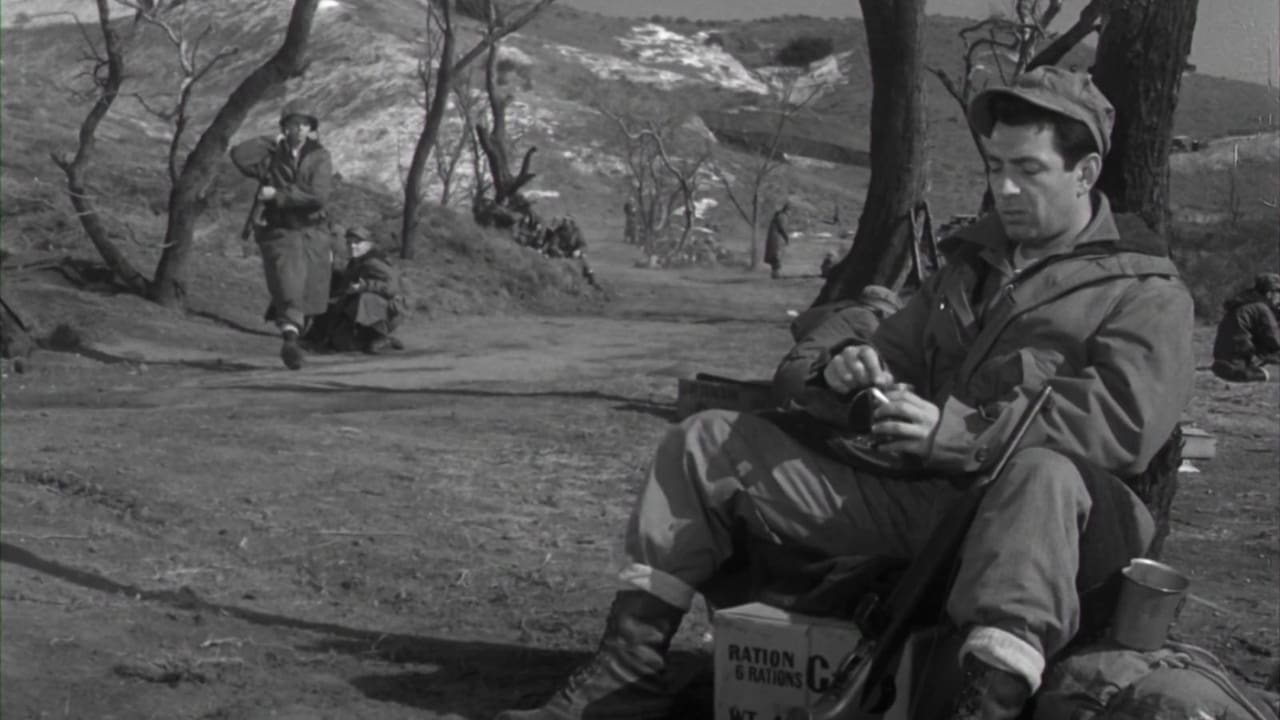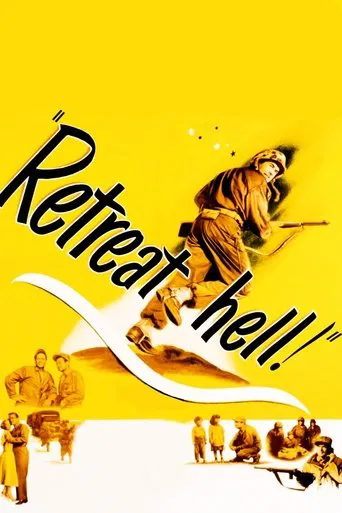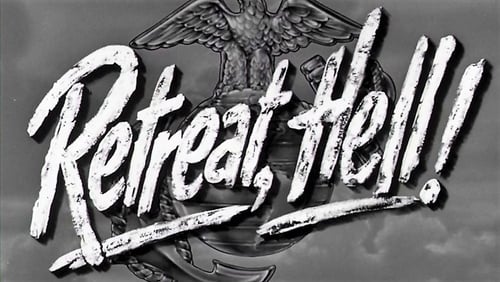


Very well executed
... View MoreThe greatest movie ever made..!
... View MoreThis is a small, humorous movie in some ways, but it has a huge heart. What a nice experience.
... View MoreGreat example of an old-fashioned, pure-at-heart escapist event movie that doesn't pretend to be anything that it's not and has boat loads of fun being its own ludicrous self.
... View MoreRETREAT, HELL! - 1952 This film, one of several that more or less, tell the same story about the U.S. Forces retreat from the Chosin Reservoir in North Korea.The film starts in the States with ex-Marine officer, Richard Carlson being called back to active service. Carlson is not all that happy with the recall but reports. His commanding officer is hard as nails, Frank Lovejoy. It is the job of the few World War Two veterans to train the fresh recruits and whip them into combat ready soldiers.Training is somewhat rushed because of the desperate situation going on in South Korea. The Reds have overrun most of the country and pushed the few surviving forces into a pocket on the southern end of the country.U.S. Forces launch a counterattack by landing at Inchon and flanking the North Korean Army. The Reds soon cave and the chase is on all the way up the peninsula. Just as it looks like the war might end, the Chinese Red Army comes boiling over the border from China. This catches the U.N. forces by surprise forcing, shall we say, a rather retrograde manoeuvre.The film follows Lovejoy's Marine battalion from training, through the Inchon landing, up through the North, and as they make their way back south.The Marines are badly outnumbered, low on ammo and poorly supplied with winter equipment. The Chinese Reds throw massive human wave attacks at the unit. This causes a dangerous run on medical supplies, and further depletes the already low ammunition reserves.It is only the odd air supply mission and constant air support that gives the Marines a chance to make their way to safety. Soon their trucks are out of fuel and they are forced to carry their growing collection of wounded. The Marines work their way through several more Red attacks and ambushes. Lovejoy gets wounded and Carlson must take command.They are joined along the way by various other retreating units, including some British Royal Marines. Needless to say they manage to make it safely to the coast and are evacuated by sea.The film, like, Alan Dwan's HOLD BACK THE NIGHT, Sam Fuller's THE STEEL HELMET, FIXED BAYONETS and Anthony Mann's MEN AT WAR all deal with this same retreat. This Joseph H. Lewis directed work is quite watchable, by not quite as good as these others. Alan Dwan directed the superb WW2 Marine film, SANDS OF IWO JIMA.The acting is fine, and the look of the film is quite good with ex special effects man, Warren Lynch at the cinematography controls. The film's director, Joseph Lewis is best known for several cracker-jack film noir such as, SO DARK THE NIGHT, MY NAME IS JULIA ROSS, THE BIG COMBO and of course, GUN CRAZY.
... View MoreThe movie traces Marine combat battalion from training base in California to South Korea's Inchon landing to North Korea's Chosin Reservoir and retreat from there to the coast for naval rescue.Several notable features are in this otherwise fairly routine war film. First, it's surprisingly de-politicized for its sensitive time period. The movie was produced in 1952, at a time when the war in Korea had stalemated and anti-communist fervor (Senator McCarthy) was at a fever pitch stateside. One would expect a lot of talk about red aggression and Chinese hordes. However, there's hardly any explanation in the narrative about where the war is or why it's occurring! Instead, the screenplay focuses almost exclusively on Marine Corps professionalism from officers to NCO's to recruits. Looks to me like the movie's purpose is to restore the Marines' popular image following the Chosin debacle, without getting involved in messy politics. After all, Marine combat in WWII had been one of steady advance across the Pacific; at the same time, footage of retreat in Korea shook American confidence in that murky war.Another notable feature is the low-budget film's effort at recreating the horrendous winter weather that plagued the retreat. I recall newsreels of the time of the steep mountains and freezing snow being almost as scary as the combat itself. I doubt the retreat over those mountain passes would have succeeded without the continuous air support.Notable too is the general absence of sometimes silly small talk that characterizes so many WWII combat films. That's understandable since the war in Korea was never popular and little understood at home, especially after the massive Chinese intervention. On the other hand, there's the kind camaraderie and bonding among the troops that could be expected, but none of the light-hearted victory-is-certain banter of 10-years earlier.As other reviewers note, the combat itself is mostly a series of clichés. However, the acting is good and Tamblyn is perfect for his idealized all-American-boy role. But the movie itself is now largely a curiosity dramatizing as it does one of America's few military retreats.(In passing—in my little book, the war was characterized by two massive blunders—first, North Korea's reckless belief that the US would tolerate a unified communist Korea only a few hundred miles from post-war Japan; and second, Gen. MacArthur's over-confident belief that China would somehow allow an American army on China's border {the Yalu river}. The result of these blunders was 3-years of war, thousands of dead, and most ironically, a return afterward to the same divided country {38th Parallel} as before the devastation!)
... View MoreWe are in the Korean War, and a U.S. Marine battalion are desperately trying to get thru a snow laden mountain pass before the better equipped enemy kill them all. With their own supplies running out and many of the Marine's losing their belief systems, it's likely that death or glory are the only options.Film's set during the Korean War are few and far between, it's almost as if it's an overlooked cinema topic in many ways. Pork Chop Hill and MASH aside, you would be hard pressed to name half a dozen films set in and around what has become the forgotten war. Now Retreat, Hell! is nothing to greatly shout about, and certainly it isn't fit to lace up the shiny boots of Gregory Peck's pork chop sizzler (sorry for that). It's however one of those films that you can stumble on with no expectation and enjoy purely on an interesting scale. Riddled with clichés and serving only to achieve its aim of bravado flag waving heroics, it carries a little emotional weight (soldiers insecurities and fears) and molds nicely the mounting tension (the wait for attack is itchy) with its competently handled gun fire. Directed by Joseph H. Lewis (7th Cavalry & The Big Combo) and starring Frank Lovejoy (In a Lonely Place & House of Wax) Richard Carlson (The Ghost Breakers & King Solomon's Mines) and a young and bouncy Russ Tamblyn (Tom Thumb & West Side Story). Retreat, Hell! wont have you hankering for another visit some time in the future, but hopefully, just like me, you will be glad that you at least gave it the time of day. 6/10
... View MoreNow, don't get me wrong, `Retreat Hell' is an action-packed film, full of tension and combat, with the expected heroism and violence.It's just that it has a...sensitive side. It somehow seems out of place for its time, more suited for the 70's than the '50s.Richard Carlson is an unlikely hero for a war picture, particularly one from the hard-edged, patriotic 1950's. He's such a sensitive, nice fellow, and, to those of us accustomed to seeing him portray science-nerds (as in `Creature from the Black Lagoon' and `It Came from Outer Space') he may seem a tad intellectual for a leader of a Marine company. Even more unlikely is baby-faced Russ Tamblyn (who was still billing himself as `Rusty' at the time) as a rough-necked Marine Corps grunt. But that's the kind of picture this was: a war movie that dealt with the human face of war, even to the point of making `our boys' seem downright sentimental, but without being even remotely a vehicle for pacifist sentiments. It's an unusual, even eccentric approach, and at times it doesn't work, while at others it surprises with effectiveness.There aren't very many war movies about Korea, today called `the forgotten war' in America. The most well-known one, `MASH,' was an unabashed allegory for Vietnam, and one quickly loses sight of the distinctions. `Retreat Hell' is much more specific, and accurate, in its portrayal of a war most Americans don't really know what to make of. It was the war we didn't quite lose, but certainly didn't win, and for the post-WWII generation, that was a perplexing legacy. Many of the more extreme patriots of the day chose to rationalize it by asserting we had been railroaded into the war by the UN, possibly as part of a Communist conspiracy. `Retreat Hell' avoids political uncertainties by focusing on the lives of brave but sympathetic soldiers, who did their duty as the American leadership saw fit to define it.The title, which sounds like a statement of defiance (`like Hell we'll retreat') is actually a somber quotation from General MacArthur. At the time the forces in Korea had overextended themselves, and become surrounded on all sides. The order was given to break through the enemy lines to the sea. When asked about the retreat in Korea, the general replied `Retreat Hell, we're advancing in the other direction.' A retreat normally means falling back through your own lines to reach a stronger position, but this was an advance, through enemy lines, to a position that would allow a retreat.Unlike many WWII pictures that were being made at the time, actual Asian actors were used to portray Asians, and not all of them were evil. The filmmakers evidently thought enough of their audience to remind them that the war was being fought for our Asian allies, not as a racist war against a generic enemy. In light of recent political developments, it is interesting to note that the British also make an appearance on our side. The Communist soldiers are portrayed as devious and callous, but not beyond the realities of the war (obviously Bad Things committed by our side are not shown) - they are not inhuman, merely the enemy.This movie gives us both action and drama, and probably was a precursor to `Saving Private Ryan' in more ways than one.
... View More